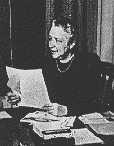|
Judith
Waller---First Lady of Radio

[Curator's
note: This piece, author unknown, originally appeared in the April,
1947 issue of The Chainbreak, NBC-Chicago's in-house newsletter.]
In spite
of the fact that it's been done before, the most natural thing is
to call Judith Waller radio's first lady, which she is, by double
right, not only as a pioneer in the field but as an executive who
dared many "firsts" in broadcasting.
Her efforts
in the educational field led to the establishment of such programs
as the University of Chicago Round Table, the American Medical Association
programs, the National Congress of Parents and Teachers series and
hundreds of other public service broadcasts from her debut in 1922---when
she put WMAQ on the air for the first time under the alias of WGU---she
believed that the new medium should offer more that entertainment.
And so it was she who suggested that actual pickup of classroom lectures
from Northwestern and the University of Chicago were feasible and
worthwhile.
LED
IN ESTABLISHMENT OF INSTITUTE
Her
pioneering led to the establishment of numerous educational children's
programs and the inauguration of the NBC Northwestern University Summer
Radio Institute which has been conducted annually since 1942.
Educators
credit her with leadership in starting radio on its road to importance
to education and her system has been used as a basis from which evolved
the Ohio school-radio plan and the Wisconsin system.
Miss
Waller's introduction to radio was one evening in 1922 when she was
called from the dinner table by Walter Strong, then business manager
of the Chicago Daily News. At that time, she was office manager of
the Central Division of the American Red Cross, but she had her eye
on the newspaper field and had asked Strong for a job. But she was
somewhat startled when he called her from the table to say, "
I've just bought a radio station; come on down and run it. She protested
that she knew nothing about running a radio station. "Neither
do I," said Strong happily, " but come on down and we'll
find out." She did and they did.
And so
WGU went on the air April 13, 1922. The fact that the station stayed
on was largely due to the fact that the lady manager literally rang
doorbells and stopped just short of kidnapping to make people appear
before her microphones.
When
talent ran short she doubled as announcer, played classical numbers
on the song bells and admits that occasionally she filled in on the
drums, too. Programs were such that often she would book a show, rush
back to the Daily News office to write it and then hurry back to The
Fair store, which housed the station, to announce the broadcast.
BEGAN
BASEBALL BROADCASTS
It was
her wide-awake attitude which brought to radio more than tenors singing
'' Ah, Sweet Mystery of Life" and discussion groups on the care
and feeding of husbands. The wistful plaint of a young friend that
"school keeps me away from baseball" gave her the idea that
led to her tackling William Wrigley on the subject of broadcasting
the Chicago Cubs' games. Whether it was shock at being tackled by
a diminutive lady who knew what she and radio wanted or the fascinating
prospect of baseball by wireless that made him agree, Miss Waller
still doesn't know. But anyhow, he signed on the dotted line and "Q"
had another first.
Radio
and educational groups have loaded her with honors, which she accepts
brightly and then heads back to work. Most recently, she was elected
to the secretaryship of the Intercollegiate Broadcasting' System and
awarded an honorary degree of doctor of letters by MacMurray College
in Jacksonville. She was given the first annual award of merit by
the School Broadcast Conference in l940 and has to her credit a book,
published in 1946, titled "Radio, the Fifth Estate," a comprehensive
text covering all phases of the industry's operations.
Among
the dozens of groups which have elected her to membership are the
Federal Radio Education Conference, the Association of Education by
Radio and the School Broadcast Conference.
Her hobbies
are books, fine recordings and photography. Incidentally, she invariably
drives male camera experts to fury by the quality of her pictures-
-which she takes with a little $15 Kodak.
Comments
or suggestions? click
here to send them to Rich Samuels
Created
by Rich Samuels (e-mail to rich@richsamuels.com)
|